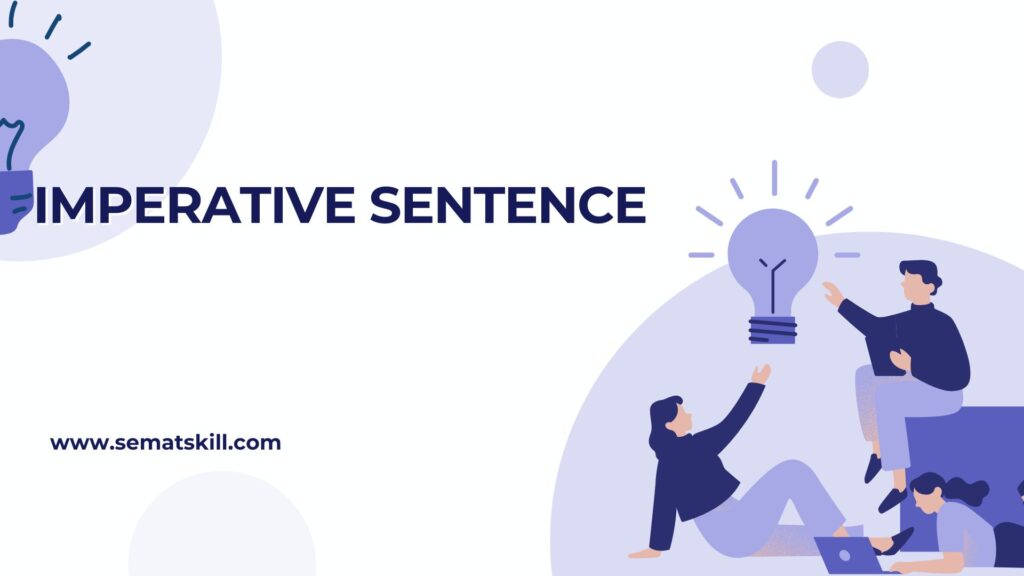Imperative Sentence
Imperative sentences digunakan untuk memberikan perintah, instruksi, permintaan, atau saran. Kalimat ini biasanya langsung dan tidak memerlukan subjek yang eksplisit karena subjeknya secara implisit adalah “you”. Berikut adalah penjelasan lengkap tentang imperative sentences.


Ciri-Ciri Imperative Sentences
- Subjek Implisit
- Imperative sentences tidak mencantumkan subjek secara eksplisit. Subjeknya adalah “you” yang tersembunyi.
- Contoh: “Close the door.” (You close the door.)
- Menggunakan Kata Kerja Dasar (Base Form of Verb)
- Kata kerja yang digunakan dalam imperative sentences adalah bentuk dasar (infinitive tanpa “to”).
- Contoh: “Sit down.” (bukan “To sit down”)
- Punctuations
- Imperative sentences diakhiri dengan tanda titik (.) atau tanda seru (!) tergantung pada intensitas perintah.
- Contoh: “Stop!” atau “Please turn off the light.”
Jenis-Jenis Imperative Sentences
- Perintah Langsung (Commands)
- Digunakan untuk memberikan perintah langsung.
- Contoh: “Stand up.” “Do your homework.”
- Permintaan (Requests)
- Seringkali ditambahkan kata “please” untuk membuatnya lebih sopan.
- Contoh: “Please pass the salt.” “Could you please close the window?”
- Instruksi (Instructions)
- Digunakan untuk memberikan instruksi atau arahan.
- Contoh: “Turn left at the next corner.” “Mix the flour and sugar.”
- Saran (Suggestions)
- Digunakan untuk memberikan saran.
- Contoh: “Take a break if you’re tired.” “Try restarting your computer.”
- Undangan (Invitations)
- Digunakan untuk mengundang seseorang melakukan sesuatu.
- Contoh: “Come to my party.” “Join us for dinner.”


Contoh Imperative Sentences dalam Berbagai Situasi
- Di Sekolah:
- “Open your books to page 10.”
- “Listen carefully.”
- Di Rumah:
- “Clean your room.”
- “Set the table for dinner.”
- Di Tempat Kerja:
- “Send the report by Friday.”
- “Attend the meeting at 3 PM.”
- Dalam Keadaan Darurat:
- “Call the police!”
- “Evacuate the building immediately!”
- Dalam Percakapan Sehari-Hari:
- “Take care!”
- “Have a nice day.”
Penggunaan Negatif dalam Imperative Sentences
Untuk membuat imperative sentence dalam bentuk negatif, tambahkan “don’t” sebelum kata kerja dasar.
- Contoh: “Don’t touch that.” “Don’t be late.”
Latihan Soal
Latihan 1: Identifikasi dan Perbaiki
Identifikasi kesalahan dalam kalimat imperatif berikut dan perbaiki:
- “Please to close the door.”
- “You sit down.”
- “Don’t forgets to call me.”
- “Be quiet please.”
- “To take this medicine twice a day.”
Jawaban:
- “Please close the door.”
- “Sit down.”
- “Don’t forget to call me.”
- “Please be quiet.”
- “Take this medicine twice a day.”
Latihan 2: Membuat Kalimat
Buatlah kalimat imperatif berdasarkan situasi yang diberikan:
- Instruksi untuk temanmu mematikan lampu.
- Permintaan kepada seseorang untuk membuka jendela.
- Saran kepada teman yang kelelahan.
- Undangan untuk menghadiri pesta.
- Perintah kepada anjing untuk duduk.
Jawaban:
- “Turn off the light.”
- “Please open the window.”
- “Take a rest.”
- “Come to my party.”
- “Sit!”
Berikut ini adalah percakapan singkat yang menggunakan imperative sentences dalam berbagai situasi:
Situasi: Di Rumah
Di ruang keluarga
A: “The TV is too loud. Could you please turn it down a bit?”
B: “Sure, no problem.”
A berjalan ke dapur
A: “Oh no, I forgot to turn off the stove. I’ll do it right away.”
B: “I’ll do it for you. You sit down and relax.”
Situasi: Di Tempat Kerja
Di ruang rapat
A: “Everyone, please take your seats. The meeting is about to begin.”
B: “Before we start, can you hand out the agenda, please?”
A: “Of course, here you go.”
Situasi: Di Sekolah
Di kelas
A: “Alright class, please open your textbooks to page 50.”
B: “Excuse me, could you repeat that? Which page?”
A: “Page 50. Let’s continue.”
Situasi: Dalam Percakapan Sehari-Hari
Di taman
A: “Watch out! There’s a bee right next to you!”
B: “Don’t worry, I’ll stay calm.”
Di restoran
A: “Please pass me the salt.”
B: “Sure thing, here you go.”
Percakapan-pencakapan ini menunjukkan berbagai situasi di mana imperative sentences digunakan dalam komunikasi sehari-hari untuk memberikan perintah, instruksi, permintaan, dan saran dengan efektif.

